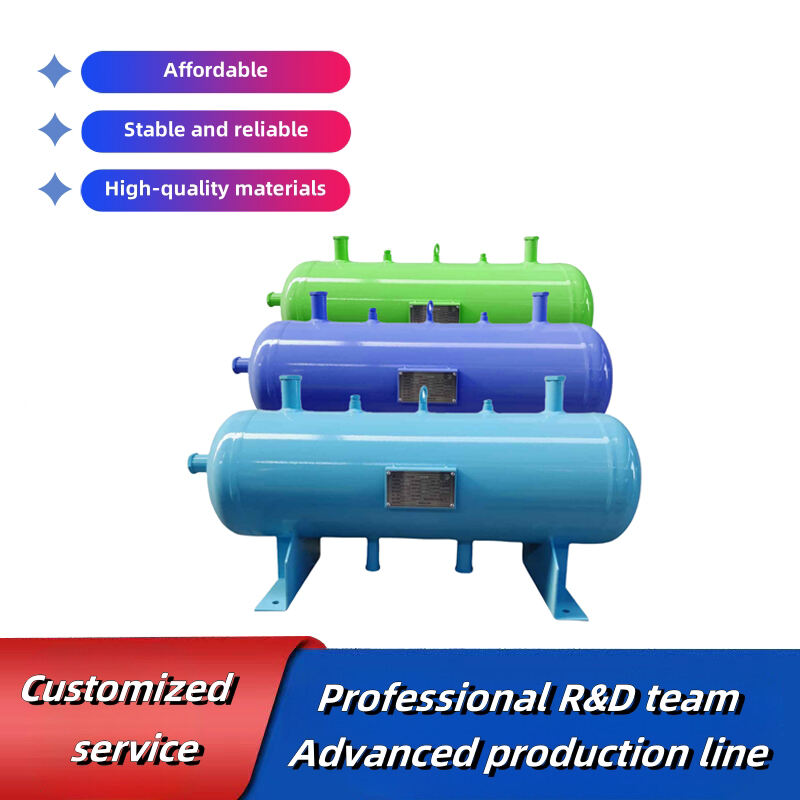Function of Vessels in HVAC Systems
Receivers and separators are essential for keeping a commercial HVAC system running smoothly. What, however, do these vessels (two examples display in figs. Plain English Version, even a 3rd grader will get it?
Receivers in an HVAC system play the role of a storage tank for refrigerant. These keep your device at the proper level of refrigerant which helps it to run as smoothly as possible. Imagine it like a reusable water bottle that you top off whenever it's about to go empty the receiver is what keeps the system refilled with refrigerant.
Separators, in contrast, are similar as screeners that can be used to get rid of the moisture or pollutants from the refrigerant. The reason for this is a dirty refrigerant cannot absorb the heat as well as a clean one, which reduces the ability of your facility to cool the air. Separators are a kind of strainer that strain unwanted lumps your tongue might not appreciate, like potatoes through a sieve they keep refrigerant clean and slippery.
Why Receivers and Separators Are Important in Commercial HVAC Systems
While to call them receivers and separators may make it seem as though these are small parts of a commercial HVAC system, they play roles that are absolutely essential. In the lack of these vessels, the system cannot carry out at its finest. Receivers ensure refrigerant stays where it needs to be, separators keep the refrigerant clean and working right.
Just like baking a cake, but without sifting the flour or using measuring cups. Likewise, a commercial HVAC system would be much less capable of effectively cooling or heating a building without receivers and separators. So, selecting the proper vessels for a job is important when aiming to keep performance peak.
Proper Vessel Selection in HVAC Systems Can Increase Efficiency
This could be the biggest factor that affects the efficiency of a commercial HVAC System is choosing the right receivers & separators. If the vessels are too big, the refrigeration plant may not be able to absorb enough refrigerant to cool the building. On the flip side, if a more substantial number of vessels are used the system could be inefficient and wasteful by wasting energy.
You just clicked the perfect bowl of porridge not too hot, not too cold. Correctly sizing and choosing the types of vessels used in a HVAC system allows for an efficient operation that ultimately saves energy and money for building owners.
Importance of Vessels for HVAC System Performance
For the best operation of a commercial HVAC system, you will require vessels like receivers and separators. The primary function of a receiver is to control the amount of refrigerant that enters the evaporator so as not to overload or underperform the system. Separators are there to prevent refrigerants from contaminating the system which extends its service life.
Vessels can be thought of as the Guardians of the HVAC system are always looking over adjusting to maintain proper operation. And all this does is create a backlog, slow things down or even cause the entire pipeline to break. Therefore, regular maintenance and correct choice of vessel is the matter that we must pay attention to in order to keep a HVAC system in good working conditions.
Integrating Receivers and Separators with HVAC Systems for Optimization
Ultimately, the receivers and separators on commercial HVAC systems are effectively integrated into the system to enhance performance while reducing cost through greater efficiency for building owners. Receivers ensure the system has sufficient refrigerant for proper operation, while separators act to keep the refrigerant clear and well away.
Like clockwork — where no gears are grinding or joints rusted with grit. Owners can invest in better receivers and separators to help extend the life of their HVAC system, as well as save on energy bills over time.
Vessels like receivers and separators, to conclude can be small part of a commercial HVAC system but they have a big impact. Building owners who are aware of this in particular their role and value can improve the efficiency further than before by merely maximizing these HVAC essentials. The performance of any new commercial HVAC system can be enhanced and its efficiency maximized with proper vessel selection and integration. Always remember, with HVAC, Zhuoli is here!

 EN
EN
 AR
AR
 HR
HR
 CS
CS
 DA
DA
 NL
NL
 FI
FI
 FR
FR
 DE
DE
 EL
EL
 HI
HI
 IT
IT
 JA
JA
 KO
KO
 PL
PL
 PT
PT
 RO
RO
 RU
RU
 ES
ES
 TL
TL
 IW
IW
 ID
ID
 LV
LV
 SL
SL
 UK
UK
 VI
VI
 HU
HU
 TH
TH
 TR
TR
 MS
MS
 GA
GA
 MK
MK
 YI
YI
 HY
HY
 AZ
AZ
 BN
BN
 LO
LO
 LA
LA
 MY
MY
 KK
KK




